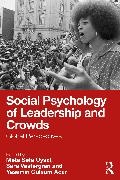Ulteriori informazioni
This timely volume brings together research on leadership and social movements, exploring the psychological and social processes at the intersection of crowd psychology and leadership studies.
Sommario
Table of Contents·
Chapter 1. Introduction: Towards an Integration of Approaches to Crowds and LeadersMete Sefa Uysal, Yasemin Gülsüm Acar, & Sara Vestergreno
Global context, relevance, and contributions of the volumeo
Bridging theoretical divideso
Chapters in the volume·
Chapter 2. 'Le Bon in Exarcheia': Cultural Pathology in Media Constructions of Political Crowd Action in GreeceNikos Bozatzis & Evangelos Ntontiso
Introductiono
Crowd theories: The contexto
Gustave Le Bon's theory of crowd psychologyo
Gustave Le Bon as a cultural theorist cum orientalisto
Cultural pathology in accounts of Greek (political) crowd actiono
The studyo
Discussion·
Chapter 3. Tibetan Identities in Exile: The Role of Dalai LamaPallavi Ramanathan & Purnima Singho
Introductiono
The Dalai Lama and Tibetan refugeeso
Entrepreneurs of identityo
Nation and national identitieso
Methodologyo
Methodo
Results and analysiso
Discussion and conclusion·
Chapter 4. 'Green' and 'Women, Life Freedom' Movements in the Islamic Republic: Khamenei's Speeches, Strategy, and Ideological Foundation for Crisis ManagementTabassom Fanaiano
Introduction: Islamic Republic 'and' Irano
Theory and frameworko
Literature reviewo
Methodology o
Analysiso
Procedureo
Findings: Construction, structure, and foundationo
Discussiono
Conclusion·
Chapter 5. The Role of Historical Narratives in Mobilisation around the Voice Referendum in AustraliaChristina Maxwell, Hema Preya Selvanathan, & Olivia Evanso
Introductiono
Historical context and the fight for Indigenous recognitiono
Historical narrativeso
Leaders of the 'Yes' campaigno
Leader of the 'Progressive No' campaigno
Comparative analysis of the 'Yes' and 'Progressive No' campaignso
The potential effects of historical narrativeso
Reflecting on the lessons from the Voice campaignso
Conclusion·
Chapter 6. Community Leadership in New Obuasi, Ghana: Countering State Impotence with Indigenous Forms of GovernanceGyasiwa Arhino
Introductiono
Understanding the context of New Obuasio
The lynching of Major Mahamao
Reason for visiting New Obuasio
Theoretical background: Legal pluralism, legitimacy, and social normso
Understanding the norms in New Obuasio
Legal pluralism: Structure and functions of the New Obuasi community leadershipo
Legal culture, consciousness, and mobilisation: An example of how residents of New Obuasi 'shop' to solve their issueso
Conclusiono
Positionality·
Chapter 7. Who represents 'the people' in 2023 Turkey? The Political Utilisation of Crowds at Political RalliesYasemin Ulüahin, Ege Akp¿nar, Yasemin Gülsüm Acar, Selin Tekin, Mesut Ayvac¿k, Elif Sandal-Önal, & Meral Gezici-Yalç¿no
Conceptual frameworko
Crowds and rallies in 2023 Turkeyo
Our aimso
Overview of approacheso
A note on reflexivityo
Ethnographyo
Analysis of Speecheso
Conclusions·
Chapter 8. The Psychology of Crowds and Leadership in the 2021 Capitol Insurrection Carina Hoerst, Stephen Reicher, John Drury, S. Alexander Haslam, Fergus Neville, Evangelos Ntontis, & Sara Vestergreno
Introductiono
Understanding crowds and leadership: Two strands of classical crowd psychologyo
Crowd behaviour and leadership in contemporary theoryo
January 6th - Applying contemporary psychology of crowds and leadership to the evento
Conclusion·
Chapter 9. Conclusion: The future of leadership and crowds in collective mobilisationYasemin Gülsüm Acar, Sara Vestergren, & Mete Sefa Uysalo
What have we learned?o
Future directions for research
Info autore
Mete Sefa Uysal is a lecturer in the Department of Psychology at the University of Exeter, UK. He was awarded the British Academy Newton International Fellowship in 2022 and the American Psychological Association's Peace Psychology Early Career Award in 2023. His research focuses on collective action, leadership, violence, social identity, climate activism, and intergroup relations.
Sara Vestergren is a lecturer in the Department of Psychology at the University of Limerick, Ireland. Her research interests and expertise include crowds, collective action, social identity, and climate action. Sara's research has a particular focus on outcomes of participation in crowds and collective action.
Yasemin Gülsüm Acar is a lecturer in the School of Psychology & Neuroscience at the University of St Andrews, UK. Yasemin's research interests include outcomes of collective action, crowds, political solidarity, social identity, and intergroup conflict.

